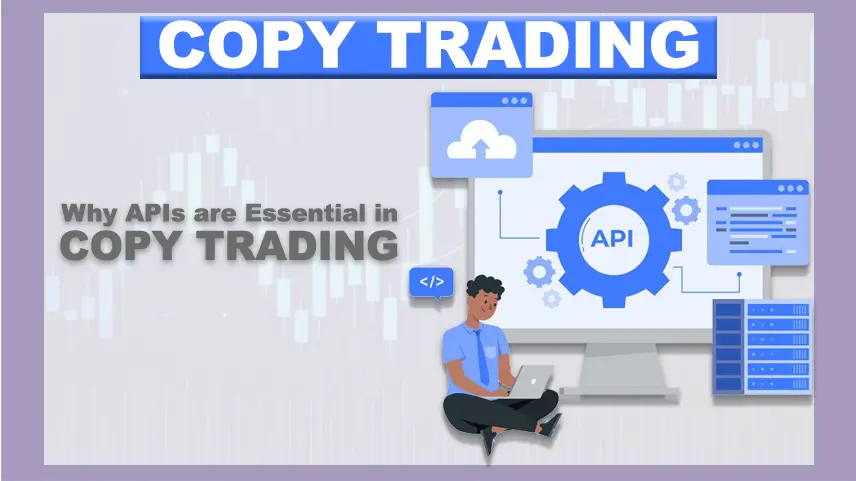
Copy trading has transformed the way people invest in
financial markets by making it simple to follow the trades of experienced
traders. But what makes this system work so smoothly? It’s all thanks to
Application Programming Interfaces, or APIs. These are the necessary tools to
ensure that everything goes without a hitch. We'll go into why APIs are
essential to copy trading in this essay, as well as how they improve the
process' overall effectiveness and efficiency.
Understanding Copy Trading
Copy trading enables individuals to automatically copy the trading activities
of the Master Account of professional and experienced traders. By connecting
their accounts to the trades of these experienced traders, investors can
potentially profit from their
strategies and
market insights.
Also read: CopyTrading is Possible Without API or Not
What is API Key Meaning?
An API key is a special code that is needed to initiate an API call or
establish a connection. The application programming interface is referred to as
API.
Software applications send and receive data
using APIs. Additionally, APIs allow programs to share functionality. An API key is required to establish a connection to and conduct
communication with another API. An early step towards cloud API security is the
use of API keys.
Similar to user authentication for mobile apps and online apps, the process of
obtaining an API key involves one API calling another and then supplying the
key to obtain access.
Contact Us for Copy Trading Inquiries
Register for call back
The Role of APIs in Copy Trading
• Real-Time Data Transmission: APIs act as the
communication channels between the copy trading platform, the master trader's account, and the connected investor
accounts. They enable the seamless and instantaneous transmission of trading
signals, market data, and account information.
• Order Execution and Management: APIs facilitate the
execution of trades by automatically transmitting the orders from the master
trader's account to the linked investor accounts. They ensure that trades are
executed at the right price
and within the
predefined parameters set by the investors, such as position sizing and risk
management rules.
Characteristics of Good API
It becomes clear from integrating different API solutions that not all APIs are
made equal. Some allow for easy integration, while others can be difficult to
use and inconvenient. Several essential elements that guarantee usability,
security, and flexibility are necessary for an API integration to be effective.
An in-depth analysis of what distinguishes an API is provided below:
- Simplicity and Intuitiveness: A quality API should be
simple to use. Having thorough, understandable documentation and useful
examples that assist users in getting started without facing a steep learning
curve is part of this.
- Robust Security: Safety is the priority. The
API needs to put strong security mechanisms in place to protect data and make
sure that only authorized users may access it. This involves making use of the
most recent authentication and encryption standards.
- Consistent Design and Behavior: An API needs to have consistent design and behavior. It should have a recognizable pattern so that
users can quickly understand how it works and anticipate what will happen in
different situations.
- Flexibility and Customization: A successful API can
be used for a wide range of applications and situations. It should have the
ability to customize its features to meet the unique demands and specifications
of various projects.
- Reliability and Performance: A good API must have
both high performance and dependability. To provide effective and
continuous service, this entails little downtime, few errors, and low latency.
- Scalability: The capacity to grow is important. As your project expands,
the API should be able to efficiently handle growing numbers of requests and
data.
- Supportive Documentation and Community: If problems should emerge, the
extensive community forums and documentation are a great help for
troubleshooting and addressing them. These tools aid in a more seamless
integration process by offering direction and assistance.
Benefits of APIs in Copy Trading
- Speed and Efficiency: Trades can be completed immediately because APIs
enable the instantaneous transfer of data. Because it enables investors to
imitate trades at the same time as the master trader and take advantage of
market opportunities without any delays, speed is essential in copy trading.
- Accuracy and Reliability: APIs take away the risk of manual errors in executing trades. By automating the process, APIs make sure that trades are carried out exactly as the master trader intended, without any human mistakes.
- Individualization and Adaptability: Copy trading
platforms can provide a great deal of customization through the use of APIs.
With a smooth interface with the trading
system, investors may decide how much to invest, which assets to trade,
and what risk tolerance they want to take on.
- Privacy and Security: APIs are important for
protecting the privacy of investment data. To ensure that financial and
personal information is well protected, they incorporate robust security
features such as encrypted data transfer, secure login procedures, and data
protection standards adherence
Integration with External Tools and Analysis
APIs in copy-trading platforms can also connect with external tools and
analysis software, making the copy-trading experience even more powerful. By
using technical indicators, risk management tools, and more market data,
investors can make better trading decisions thanks to this link.
Check out the pricing details for copy trading
Price
Conclusion
The master trader's account and the investors' accounts can easily share data
and execute transactions with each other thanks to APIs, which are important to
copy trading. Their quick response, precision,
and ability to be customized play a big role in making copy-trading strategies
more effective and efficient.
Read Also:
